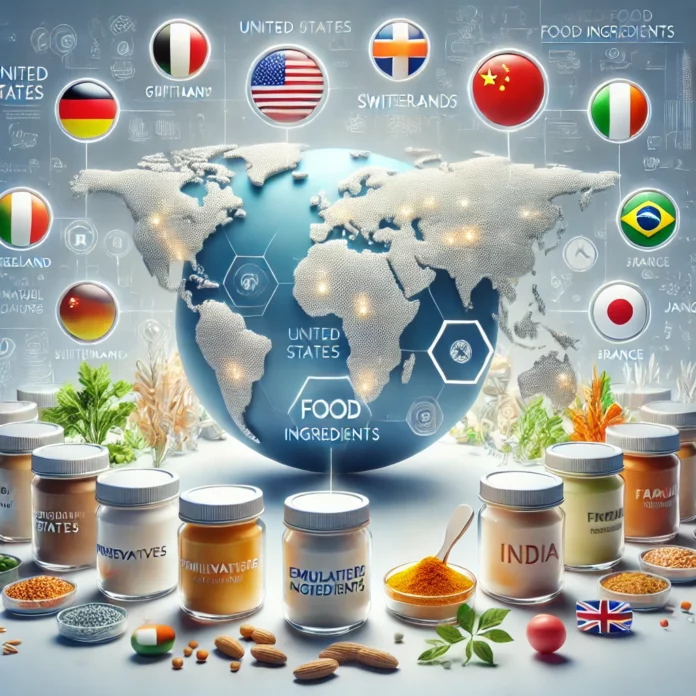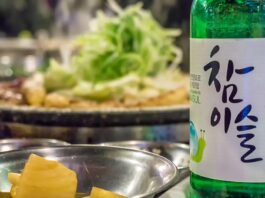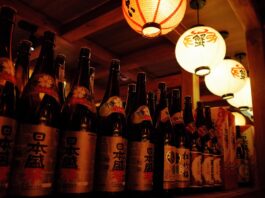The global food ingredients industry is powered by key countries that excel in producing preservatives, emulsifiers, thickeners, fortifiers, acids, and food colors. These nations leverage advanced technology, abundant resources, and innovation to supply high-quality additives globally. Here’s a closer look at the top 10 countries leading the food ingredients market.
1. United States
Specialization: Emulsifiers, preservatives, fortifiers, and clean-label solutions.
The U.S. leads the industry with giants like Cargill, ADM, and Ingredion offering cutting-edge innovations. The country’s focus on sustainable and natural ingredients is shaping trends globally.
Why the U.S. Excels: Advanced R&D infrastructure, consumer-driven demand for innovation, and a robust agricultural sector.
2. Germany
Specialization: Food colors, fortifiers, sustainable additives, and flavors.
Germany is home to companies like Symrise and BASF, which dominate in producing synthetic and natural food colors, fortifiers, and preservatives.
Why Germany Excels: A strong chemical industry, precision manufacturing, and commitment to sustainability.
3. Switzerland
Specialization: Natural flavors, colors, and fortifiers.
Swiss companies like Givaudan and DSM-Firmenich lead the market in premium and sustainable food ingredients, catering to high-end food manufacturers.
Why Switzerland Excels: A reputation for quality and precision, coupled with cutting-edge innovation.
4. Ireland
Specialization: Emulsifiers, nutritional solutions, and natural flavors.
The Kerry Group, headquartered in Ireland, is a global leader in emulsifiers and clean-label solutions, supporting the growing demand for health-conscious food products.
Why Ireland Excels: A strong agricultural base and focus on innovative food technologies.
5. Netherlands
Specialization: Plant-based and bio-based ingredients.
Dutch companies like DSM-Firmenich are driving innovation in bio-based emulsifiers, probiotics, and nutritional fortification.
Why the Netherlands Excels: Expertise in sustainability, biotechnology, and food innovation.
6. China
Specialization: Preservatives, thickeners, and cost-effective additives.
China dominates the global supply of thickeners like xanthan gum and preservatives like sorbates, supporting food manufacturers worldwide.
Why China Excels: High production capacity, cost competitiveness, and increasing focus on clean-label products.
7. India
Specialization: Natural colors, herbal preservatives, and flavor additives.
India is a global leader in turmeric-based colorants (curcumin) and plant-derived antioxidants, supported by its spice heritage.
Why India Excels: Rich natural resources and traditional expertise in herbal and spice-based products.
8. France
Specialization: Functional food additives, fortifiers, and premium natural flavors.
France is renowned for its nutritional fortifiers and clean-label thickeners, catering to both mainstream and luxury food markets.
Why France Excels: A culture of premium food production and commitment to innovation.
9. Japan
Specialization: Fermented additives, umami enhancers, and functional food ingredients.
Japan leads in producing MSG, fermented food additives, and health-oriented probiotics, reflecting its strong culinary traditions.
Why Japan Excels: Advanced biotechnology and a focus on functional food innovation.
10. Brazil
Specialization: Natural thickeners, emulsifiers, and sweeteners.
Brazil is a major producer of plant-based thickeners like guar gum and a global leader in sugar production, essential for beverages and confectionery.
Why Brazil Excels: Abundant agricultural resources and cost-efficient production.
Conclusion
These countries play a pivotal role in the global food ingredients industry, contributing to innovation, sustainability, and consumer satisfaction. From natural colors in India to cutting-edge emulsifiers in the U.S., each nation brings unique strengths to this essential sector.



